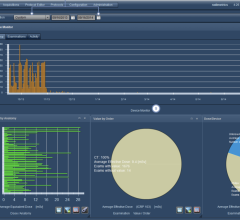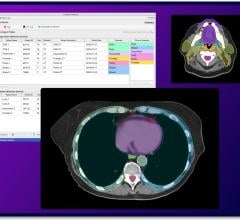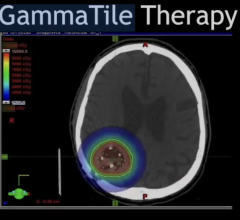Innovative technology performs automatic segmentation and lesion detection in prostate MRI scans to assist in PI-RADS scoring for prostate cancer management

April 11, 2022 — RSIP Vision, an experienced leader in driving innovation for medical imaging through advanced artificial intelligence (AI) and computer vision solutions, announced a new tool for prostate MRI analysis. The tool performs segmentation of the prostate, its sub-sections, and lesions. It analyzes the lesions’ intensity, restriction, size, and shape, and provides a baseline for Prostate Imaging–Reporting and Data System (PI-RADS) score. This information is reported to the radiologist for consideration, reducing examination time and lowering misdiagnosis rate. This new vendor-neutral technology will be available to third-party MRI manufacturers and viewer solutions, allowing a more accurate and efficient way to report prostate MRI examination.
“MRI is an advanced imaging tool, specifically for soft tissue like the prostate gland, with potential for improvement using AI,” said Ron Soferman, CEO at RSIP Vision. “Deep learning (DL) algorithms can be developed for accurate segmentation of the prostate, the transition zone (TZ), the peripheral zone (PZ), and the suspicious lesions. The system can automatically detect and calculate the lesions’ dimensions, volume, intensity, restriction, and edge smoothness in all the different scan parameters. Additionally, this tool can compare current and previous scans and highlight the differences, providing additional feedback for the radiologist prior to scoring.”
The PI-RADS scoring method was developed to allow uniform scale for prostate cancer assessment. It consists of descriptive parameters for the lesion shape, location, intensity, and restriction, each of which corresponds to a different score representing suspicious features for prostatic cancer. Currently, it is performed manually and is a time-consuming task for radiologists, with a high rate of inter-observer variability. RSIP Vision’s new PI-RADS assistant provides objective analysis of the prostate MRI scan, with measurable statistics which can be used to improve scoring accuracy. Also, it is common to perform follow-up scans in patients diagnosed with prostatic cancer. The PI-RADS assistant compares lesions from previous scans and presents the differences to the radiologist, providing a map of the lesion growth, withering, or stability.
“Prostate MRI scans are very common, and their rate increases with increasing life expectancy,” said Dr. Rabeeh Fares, Senior radiologist at Sourasky Medical Center, Tel Aviv, Israel. “Reviewing these scans accounts for a large portion of the radiologist’s workload. The PI-RADS assistant will significantly reduce examination time, improve scoring accuracy and precision, and ultimately lead to better clinical outcomes.”
For more information: www.rsipvision.com
Related prostate MRI content:
MRI-guided Radiotherapy Appears to Lead to Fewer Side Effects from Treatment for Prostate Cancer
Mount Sinai Health System Launches First-Ever Mobile Prostate Cancer Screening Unit in New York City
Genetics Predicts Toxic Side Effects to Prostate Cancer Radiotherapy
3-D Imaging Method May Help Doctors Better Determine Prostate Cancer Aggressiveness


 May 03, 2024
May 03, 2024 








